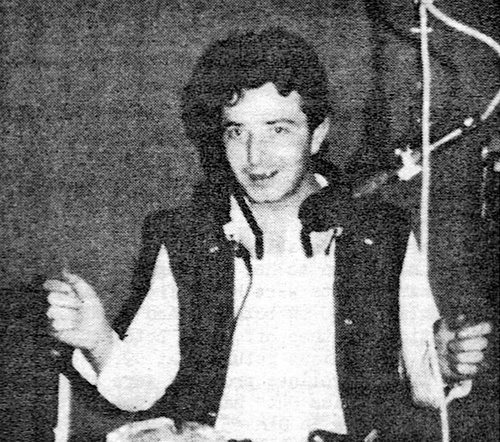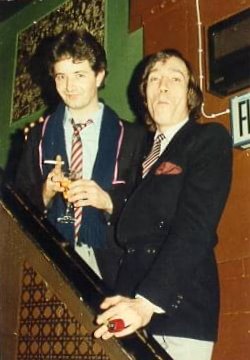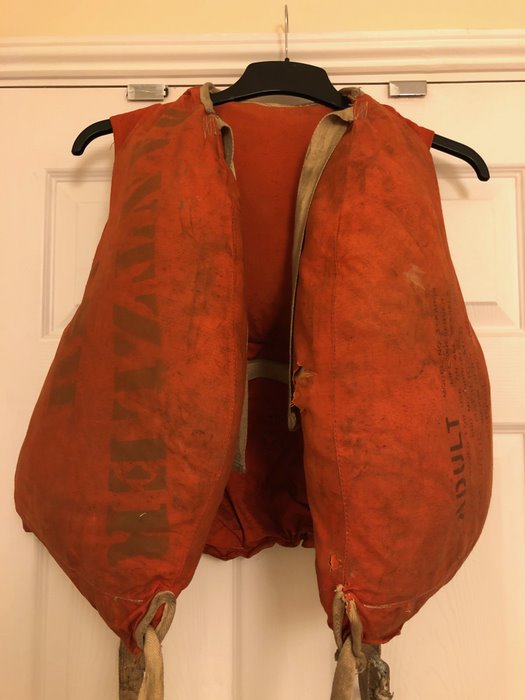Ray Clark has interviewed numerous people involved with Radio Caroline for documentaries and his book, Radio Caroline: The True Story Of The Boat That Rocked (reviewed here).
|

|
|
Nick Richards. Photo by Anoraks UK, reprinted from ‘Offshore Echos’.
|
One of his interviews was with Nick Richards.
Nick originally joined Radio Caroline as a crew-member in 1979 to help clean up the ship, the mv Mi Amigo, after its near-sinking in January that year (see ‘Caroline in the Seventies’). In September
he presented his first show and from the beginning of November became a regular member of the on-air team. He was one of the guys rescued from the Mi Amigo on the night the ship sank.
Although Nick did return to Caroline to broadcast from the mv Ross Revenge in the eighties, this interview concentrates on his time aboard the Mi Amigo.
The recording only contains Nick's side of the conversation. We are grateful to Ray for sharing it with us.
FIRST IMPRESSIONS OF THE MI AMIGO.
NICK RICHARDS: My very first impressions of going out to Radio Caroline were the state of the ship and how bad and tatty it was looking. It had seen much better days. But bearing in mind it had almost sunk a few
months earlier, maybe that was some of the reason for the rust and her lack of paint. It really looked as if it had seen its best days but once you got on board and were inside the ship it was very warm, very cosy and people were
always very friendly, although on my first time out there was really just a skeleton crew. There were only two people out there actually but three of us went out with the idea of cleaning up and making the ship and cabins habitable
again after that previous almost-sinking session. Seawater mixed with the ship's fuel had been sloshing around inside cabins, walkways, studios, so there was a lot of work that needed to be done then. There was never any definite
indication of when the radio station would come on and certainly not that any of us would be able to take part in that broadcasting[1].
|

|
|
Nick Richards, left, and his old Caroline colleague Tony Allan while they were both working for South Coast Radio in Ireland. Photo posted on Facebook by Don
Stevens.
|
WEATHER CONDITIONS.
It was winter when I got out there for the very first time. Many would say that's probably the worst time to go out. The ship, in those days, used to be anchored almost 20 miles out at sea. It's really open sea and the North Sea
in February, March, January - that sort of time - can be quite hostile. But it was pointed out to me that if you could do programmes (in bad weather) more-or-less standing up, holding onto turntables and bits and pieces of equipment,
and grabbing the microphone before it swung out of the window, or porthole - never could get that right! - you could probably do it anytime and almost anywhere in the world. And that's very true.
COLLEAGUES.
I think in those days, from my experience, (they were) some of the most unlikely individuals you could ever expect to be thrown together, and they all gelled so well for a common cause, to do some very good radio and maybe bring to
the attention of people artists that no other radio station was playing at the time. It always had that kind of cutting edge at Caroline. I enjoyed it so much and learned so much - certainly in the first year I spent there - about
broadcasting in general, music and different styles, and artists. It was a catalogue of stuff. I don't think I have ever really learned quite so much in such a condensed way ever before.
 Nick Richards on Radio Caroline just after midnight on 9th November 1979. This clip is taken from a recording shared on the Internet Radiocafé, now known as the Radiotrefpunt (radio meeting point) forum by ‘Scotty’. Our thanks to him (duration 2 minutes 20 seconds)
Nick Richards on Radio Caroline just after midnight on 9th November 1979. This clip is taken from a recording shared on the Internet Radiocafé, now known as the Radiotrefpunt (radio meeting point) forum by ‘Scotty’. Our thanks to him (duration 2 minutes 20 seconds)
THE FOOD.
The food supplies on board the ship... Sometimes they'd be good; sometimes not so good; sometimes really bad. The summer was often the best time because it was easier to tender the ship. I remember someone coming up with a brainwave
at one point of sending out meat pies, which we'd never had before - not in my time at least. Some deal had been done and there were carton upon carton of these meat pies which made their way out to the ship. They were put into the
freezer and seemed to go down very well, especially with the Dutch crew and presenters on board the ship. One night we all sat down to have our evening meal and the Captain was winking at one or two of us so the Dutch couldn't see.
He was going to play some sort of joke on them. Sadly the Dutch were always the brunt of those jokes on board. I don't know why. But we sat down one night, the pies were dished out, put the vegetables on our plate as well.
The Dutch were really tucking into their meat pies which they really liked. Nobody knew what was in them. You sort of figured it was beef - something along those lines. The Captain asked the main senior Dutch presenter on board if he
was enjoying his pie. “Yes, fine, very nice, very tasty”, carried on eating and the Captain said “do you know what goes into those pies?” and all the Dutch kind of stopped eating and looked up at the Captain.
“No, what is it?” “Well it is fine meat, no bother with it, but you might find it unusual. It is actually donkey. They are donkey pies.” And all the Dutch in protest put down their knives and forks and, almost
to a man, walked out of the mess room and they never touched those donkey pies ever again. As far as I know they weren't donkey pies but they could well have been. But from that moment the Dutch never wanted to see those so-called
donkey pies ever again. It was a real funny night - for us but maybe not for the Dutch - although they usually had their way of getting us back, one way or another.
WHAT DIDN'T YOU LIKE?
Probably one of the things that most people didn't enjoy about working for Caroline was being left out on the ship for longer than you'd planned, or longer than you'd been told by the office you were going to be out there. There were
always certain songs that would be very popular at those sort of times: Take Me Home by Phil Collins; Won't Get Fooled
Again by The Who; Sloop John B - The Beach Boys... Those kind of things that used to prompt action of one sort or another. I wasn't actually on board at the time but
I have heard the story related several times to me so I think there must be some truth in it that one individual was left out on the ship for so long that he decided to record a spoof commercial. It was for an album called ‘50
Golden Test Tones’ for an anniversary of the old pirate ships of the sixties. I think it went something along the lines of “Remember Swinging Radio England? (whistles) Remember Radio London? (whistles) Remember Radio
Luxembourg? (whistles)” and it kind of went on like that. It was nonsense really but the point got home. And so did that man. Within about 24 hours a tender was out and they were told “stop playing that stupid
commercial”.
 Nick Richards on Radio Caroline soon after midnight on 1st December 1979. A studio recording, it was shared on the Radiotrefpunt (radio meeting
point) forum by ‘Scotty’. Our thanks to him (duration 3 minutes 28 seconds)
Nick Richards on Radio Caroline soon after midnight on 1st December 1979. A studio recording, it was shared on the Radiotrefpunt (radio meeting
point) forum by ‘Scotty’. Our thanks to him (duration 3 minutes 28 seconds)
ANY OTHER FUNNY INCIDENTS?
I remember one occasion when the chief engineer was going off and some other people had come on board the ship. Somebody made the decision to go and try to tweak up the transmitter just a little bit more, just to get a little more
power out of it. Well (laughs) that was the plan. Well we went down and I think somebody did tweak it up just a little bit. There must have been four or five of us down in the transmitter hold, which was quite low down at the front
of the ship. We had a couple of Dutch people just wandering around curious because it was an area of the ship that they had never really gone into. And one of them decided to open one of these huge cabinets which was part of the
transmitter. It was a huge cabinet with dials and coloured lights on. This particular guy just opened it. There was the most almighty bang and a blue flash across the top of the transmitter cabinet. You've never seen five or six more
worried men try to run up a vertical ladder so quickly! What it did was knock the station off the air. We all thought we'd blown the bottom out of the ship and we were about to sink in minutes, so people were doing checks along the
deck, leaning over to see is the water getting any higher (laughs). Unbelievable when you think about it, but we stayed off the air for quite a long time simply because nobody had the nerve to turn the transmitter back on. Well we
left it maybe six, seven, eight hours then we said “well we're not going to get an engineer out here for at another few days, maybe even a week, so we've got to do something” so we cranked the generator up; turned the
transmitter back on; no problem. It was only when another transmitter engineer was out there at one point, he told us that that particular engineer did have a habit of laying rather elaborate traps for any bits of his own personal
equipment, which is what we discovered when someone decided to open one of the transmitter cabinets! We thought we were sunk. The most famous radio station of the sixties, seventies and eighties and we've just sunk it in about 20
seconds! But it wasn't the case.
THE NIGHT THE MI AMIGO SANK.
|

|
|
Nick Richards's lifejacket from the night he was rescued. Thanks to Nick for the photo.
|
The one ship that Radio Caroline had had through the sixties, the seventies and just into the nineteen-eighties was the Mi Amigo and what a day March 19th 1980 turned out to be - not only its final day but a day of real high drama.
For me it had begun around lunchtime when one other person on board the ship had come down (to my cabin) and said “we've lost the main anchor”. I came onto the deck and, true enough, it was away. The first thing to do,
naturally enough, was to put the emergency anchor down before we drifted around too much. We managed to do that in a lot longer (time) than it should have been really. Although there was an emergency anchor always there with tons of
chain, it had been left on the deck for so long that it was corroded together. It was like one massive lump, trying to put it over the side. Once that was done, the next thing to do was get in touch with the coastguard, let them
know. They seemed not too worried. They gave us our position. What became a little more worrying later was they said “at low tide you're only going to have around one metre of water underneath the ship”. By that stage we had decided
just to put out pre-recorded music for most of the day and live messages to the office to alert people on land. The coastguard had automatically sent out a lifeboat which reached us by late afternoon. Really it was just to see what
the weather was going to do and could we ride the storm. It had been a fairly rough and tumble couple of days prior to that but come early evening we settled down onto that sandbank, as predicted by the coastguard, and that was all
fine. There was no problem. It was really hours later when the ship began to lift off the sandbank and sand, soft as it may be, that far out at sea it tends to be quite hard. It seemed to be starting to break up some of the temporary
holes we'd repaired in the weakest area of the hull, which was the engine room and generator room. One or two holes were appearing there which the pump could take without any problem. But, when the ship started pounding continually
on that sandbank, it reopened so many of the old holes. It was my turn to go and do some radio watch, just letting the coastguard know exactly what was happening. Same with the lifeboat. So I walked along the deck and up to the
bridge, into the radio room and, just before, I popped my head into the engine room to see how the water level was there. By that stage it was way over the plates of the bilges in the engine room, which is a good ten inches or a
foot, if not more. The water was coming in fairly fast so we put another pump down there and I told whoever was on radio watch to report that the situation was getting a little bit worse. By that time the lifeboat was encouraging us,
all the time, to come off. So too was the coastguard but we thought “No, the ship has had so many close shaves, this is just another one of them”. Of course we didn't know what was to await us really, a matter of hours
later. We all got together and we decided let's put all the pumps in that one area where the water seems to be coming in. But with all the pumps down there, water was still coming in quicker than we could pump it out so we decided
maybe that's enough. Perhaps we should go onto the lifeboat. We decided the station would close down. On air we said we'd be back, hopefully, as soon as we can, as soon as the storm blows itself out. We went onto the lifeboat - and
that was an operation in itself. It took so long and all credit to that lifeboat crew from Sheerness in Kent who had spent most of the day just sitting off, watching and waiting, and ready to help in whatever way they could. We were
still on the edge of a sandbank and they were trying to almost throw each member of the Caroline crew onto the lifeboat as it zipped by very quickly, with neither the lifeboat or the ship touching at any point. It just skimmed by and,
if it was close enough, someone would be thrown over. It took the best part of an hour to get the four people - and the canary, of course, Wilson the canary (onto the lifeboat). Once we were all finally on board the lifeboat, it must
have been half past 12, something like that, just into March 20th, and the lifeboat crew were very good. They filled us with brandy and rum as they just sat off the Mi Amigo to see how the weather was going to take. We'd maybe been
on board ten minutes, quarter of an hour, when the door to the sealed unit in the lifeboat opened and one of the crew said “well, I don't want to worry you but all the lights have just gone out on your ship”. So, at that
stage, obviously the water had got to the generators which were reasonably high up in the ship. Nobody really needed to say anything. We just looked and one another and said “that's probably it. If it's not, there's no
way we can get back on it tonight”.
 Stevie Gordon and Tom Anderson closing Radio Caroline down for the last time from the mv Mi Amigo. This recording was kindly shared by ‘Scotty’ on the
Internet Radiocafé forum, now known as the Radiotrefpunt (radio meeting point). Our thanks to him (duration 1 minute 35 seconds)
Stevie Gordon and Tom Anderson closing Radio Caroline down for the last time from the mv Mi Amigo. This recording was kindly shared by ‘Scotty’ on the
Internet Radiocafé forum, now known as the Radiotrefpunt (radio meeting point). Our thanks to him (duration 1 minute 35 seconds)
|

|
|
Nick Richards now. Photo © Cork's C-103.
|
BROUGHT ASHORE.
The lifeboat took us to Sheerness where there were quite a number of Kent police constabulary waiting for us, together with representatives from the Home Office there to interview us. The police took us along to their canteen
where they looked after us - hot drinks, something to eat - and the representatives from the Home Office were very good. They said “you're cold, you're wet, you've had a terrible night. We don't want to be here and you don't.
Tell us what you can and that's it.” And that was really the end of it. They never prosecuted anybody for that particular night. It was the end - although, for most of us, I don't think we really expected it. It wasn't until a
few hours later when we saw the TV footage on the lunchtime news. They'd sent a TV crew out in a helicopter and all you could see was an expanse of sea and just that aerial that was still poking out of the sea, as it somehow managed
to do for another two or three years, I think, at least. That was the end of a very eventful high-drama kind of day, and for many it seemed like the end of Radio Caroline. But, if you followed the story, you'll know it opened another
chapter just a year or two later[2].
|

